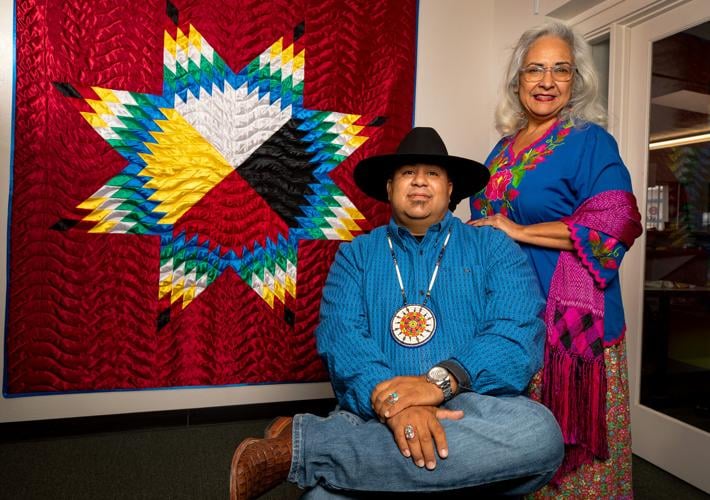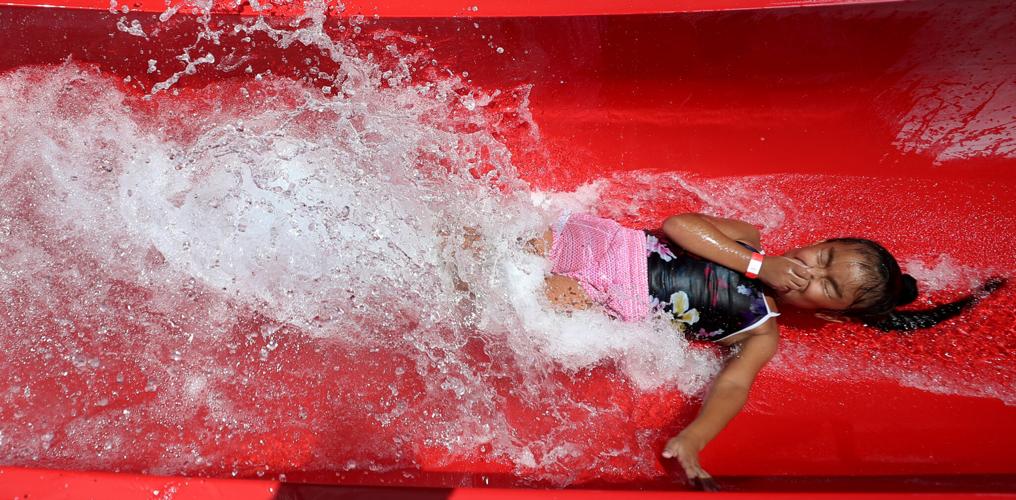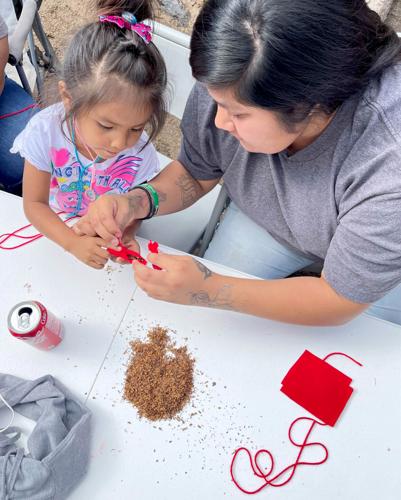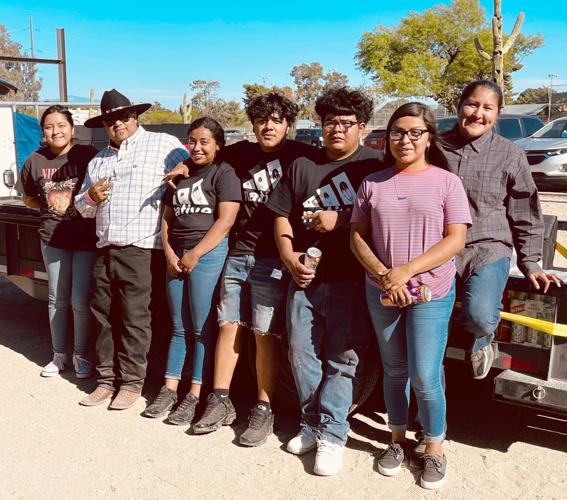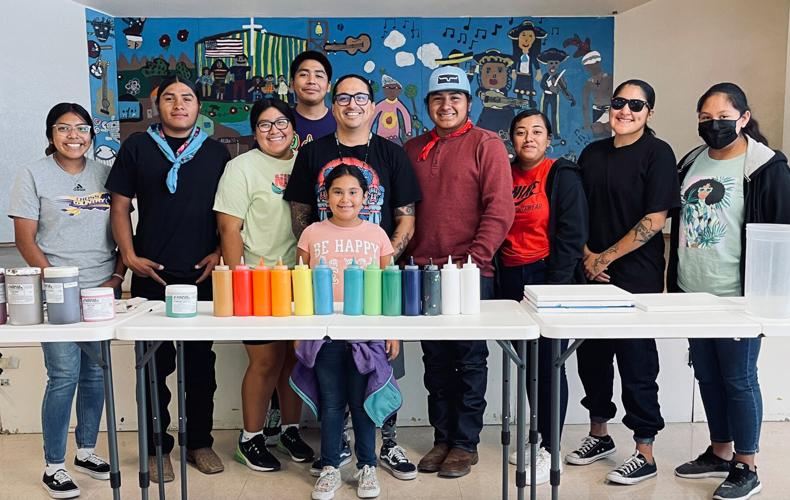When he was a teen, Vince Flores-Maldonado was drawn to gangs in the Yaqui community of Guadalupe, south of Phoenix.
His mother raised her son with morals and values, but he put those teachings aside for a life where for each criminal deed he committed, he gained admiration from his peers. He believed he belonged to a loyal brotherhood.
That false brotherhood was the beginning of a life of drugs, alcohol and spending years behind bars at a juvenile detention facility in Salinas, California, for bank robbery. Soon after he was released, he was arrested for drugs and served two years in prison.
It took years for Flores-Maldonado to learn to forgive himself, love himself and heal from substance abuse.
That journey began with Native American teachings when he was in his early 20s, and he moved in with his uncle on desert acres in the middle of nowhere in Wittmann, 35 miles northwest of central Phoenix.
He traveled with his uncle to reservations in Arizona, California and the Dakotas and learned about Native American spirituality, and teachings that connected him to Mother Earth, the seasons, sacred ceremonies and nature’s circle of life.
These teachings made him whole and led to his sobriety for 13 years, said Flores-Maldonado.
He is living a life where he is helping others as founder and CEO of Native Music Coalition, a nonprofit organization that offers Indigenous youth, families and adults an opportunity to explore Native American culture with activities designed to heal, restore and preserve Indigenous identity. The program offers services to communities in Southern Arizona.
Flores-Maldonado, an artist who began the coalition’s work with Yaqui families in 2016 — two years before it became a nonprofit — received help from other Indigenous artists who recognized Western medicine was not treating the spiritual needs of Native American families.
The artists, including a singer, a DJ and a muralist, held events for youth and families, and they saw a cultural yearning among participants in search of Native American spiritual healing as an integral part of treatment that included substance abuse, depression, physical and emotional abuse, anxiety and bereavement.
The limited work continued on a shoestring budget through the sale of silkscreen T-shirts with Native American slogans, arts and crafts, fundraisers and donations.
Now, Native Music Coalition, at 811 S. Sixth Ave., has an annual budget of $720,000 from grants, donations and reimbursements for services through the Arizona Health Care Cost Containment System, the state’s Medicaid program.
The coalition has a Native American staff of 35, including therapists, behavioral health technicians and counselors who are members of the White Mountain Apache Tribe, Pascua Yaqui Tribe, the Navajo Nation and the Tohono O’odham Nation.
They offer treatment at a Wellness Center where activities include painting, drum- and- gourd-rattle-making, beadwork and talking circles designed to help clients connect to their emotions, resulting in soothing and calming effects.

From left, Sonya Salway, Vince Flores-Maldonado, Parris Joaquin, Joe Thomas, Devin Joaquin, Jackie Ramirez and Blossom Gonzales are mentors from Native Music Coalition.
Participants also travel on group outings to reservations to learn about ceremonies and their meanings, giving a sense of identity.
Some trips include visiting the Gila River Indian Community for the Sundance gathering that attracts hundreds of Indigenous people from numerous nations. The Sundance is a sacred ceremony that originated with the Lakota people, but the ceremony has been adopted by other nations and each tribe may have its own distinct version of the ceremony. For some, the ceremony is in thanks to the sun, and prayers are said for the healing of Mother Earth, for humanity and in thanks to the Creator for all good things.
Other outings include traveling to Sells, the capital of the Tohono O’odham Nation, for cholla bud harvesting — a nutritious fruit used in salads and other dishes. They also travel to the lush White Mountains to attend performances of the Apache Crown Dancers. who perform a ceremonial dance to protect the community from disease and enemies.
The center offers youth and families participation in a horse camp where they learn basic horsemanship and how the horse ties in to Native American culture.
As they work with a horse, youth and adults learn coping skills, boundaries, responsibility, wellness and spiritual identity. Sweat lodges are available — a small, enclosed hut where water is poured over hot rocks to create steam and participants remain in the hut praying, during which physical and spiritual purification takes place.
The coalition also operates a housing program for men, and a program for women and their children so families can heal and learn skills to become whole, which will give them a better chance to stay together. Those who participate must complete detox treatment and also a residential treatment program before they enter the coalition’s housing programs.
Clients learn skills to maintain sobriety, live independently, maintain accountability, find employment and take money management classes.

The coalition’s work with Yaqui families in 2016 — two years before becoming a nonprofit — launched with help from other Indigenous artists who recognized Western medicine was not treating the spiritual needs of Native American families.
Finding healing through culture
Western medicine treatment is dominant in the behavioral health system, but Flores-Maldonado knows that is not everyone’s answer to healing.
“Western medicine wasn’t reaching me totally. I was challenged with overcoming alcoholism and addiction. Finding ways to cope and maintain sobriety was difficult for me,” explained the 39-year-old artist.
His uncle showed him the way when he went to live with him in Wittmann in 2004, said Flores-Maldonado, who is a certified peer support specialist trained to support those who struggle with mental health, psychological trauma, or substance use. His personal experience with these challenges provide him with expertise that professional training cannot replicate. Flores-Maldonado has a bachelor’s in substance abuse counseling from Grand Canyon University and he is working on a master’s degree.
“My uncle used his land for teaching. He was a spiritual leader and he lived in a single-wide manufactured home. We had to haul water to the acres and he used solar energy to charge the phones, operate the water pump and to look at TV,” recalled Flores-Maldonado, who learned manual labor from his uncle.
“He was a big influence on Native American communities in the Western region. I was lucky enough to travel with him and learn about the different cultures. It was rugged but I learned patience on my journey,” said Flores-Maldonado, who took trips to the Fort Yuma Quechan Indian Tribe’s reservation, which is located on both sides of the Colorado River near Yuma and it borders Arizona, California and Baja California, Mexico. Much of its land is used for agriculture and tourists are attracted to fishing, water skiing and swimming at lakes along the Colorado River.
Native Music Coalition is a nonprofit organization working with youth, families and individuals who want to explore Native American culture and restore and preserve Indigenous identity. The Coalition also operates a wellness center, offering behavioral health treatment using Native American spiritual and cultural practices. Video by Carmen Duarte/Arizona Daily Star.
The two took trips to the Manzanita Band of the Kumeyaay Nation, located 67 miles east of San Diego, and Flores-Maldonado was among members who were known for their fishing, hunting, farming, basket weaving and pottery. His travels to the White Mountains, the Fort McDowell Yavapai Nation, Pascua Yaqui communities and the Tohono O’odham Nation all gave him a look at traditions passed down by elders.
“I learned the role of an Indigenous man is to provide for the family, the importance of protecting women, and to also take care of the elders, and to be a positive role model in the community. I learned how to pray in traditional ceremonies, and learned to appreciate nature, the sun, the moon .... waking up each morning and appreciating our culture and those who fought to speak our language. I feel connected to the ancestors who died to preserve our way of life,” explained Flores-Maldonado.

Native Music Coalition offers treatment at a Wellness Center where activities include painting, drum- and- gourd-rattle-making, beadwork and talking circles designed to help clients connect to their emotions, resulting in soothing and calming effects.
‘Holistically and unconditionally’
Anna Tarazon, office manager and program coordinator for the organization, said the coalition serves clients that “don’t necessarily fit” in other programs.
“It was designed to fit the needs of Native American folks who are enrolled or not enrolled within their tribe for services,” she said of the coalition’s mission.
The coalition serves 220 clients a year, and some services, such as food boxes and educational supplies for children, are provided for free. Other services are paid through the Arizona Health Care Cost Containment System. The coalition holds community events to get the word out about its services, and also uses social media.
Tarazon recalled seeing Flores-Maldonado “struggle in the beginning when he put together music workshops on the (Pascua Yaqui) reservation, and he saw the need for behavioral health services for depression and anxiety by people who had exhausted their services within the tribe, or did not trust the system to open up and discuss their problems.”
The former Pascua Yaqui Tribe project manager for social services and a former associate evaluator and research analyst for tribal behavioral health programs, said she also recognized that cultural and spiritual aspects in behavioral health treatment were missing from tribal programs.
Once Flores-Maldonado had strong financial footing for Native Music Coalition, Tarazon left her position with the tribe and went to work for Flores-Maldonado. The two have been partners for 10 years and adopted five Yaqui children.
“I really believed in his vision. I really believed the coalition’s mission was going to work,” said Tarazon, who received a bachelor’s in human studies from Prescott College, and completed two years in a program for a master’s of social work at Arizona State University.

The center offers youth and families participation in a horse camp where they learn basic horsemanship and how the horse ties in to Native American culture.
The coalition’s offerings, including sweat lodges and certain spiritual cleansing ceremonies, are done because the agency believes in “treating a person holistically and unconditionally,” said Tarazon.
“People come with traumas and when they begin questioning their connection to spirituality, we welcome it as they search for their wellness. We encourage their connectiveness to Native American practices.”


